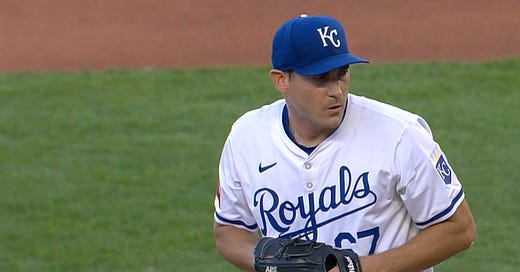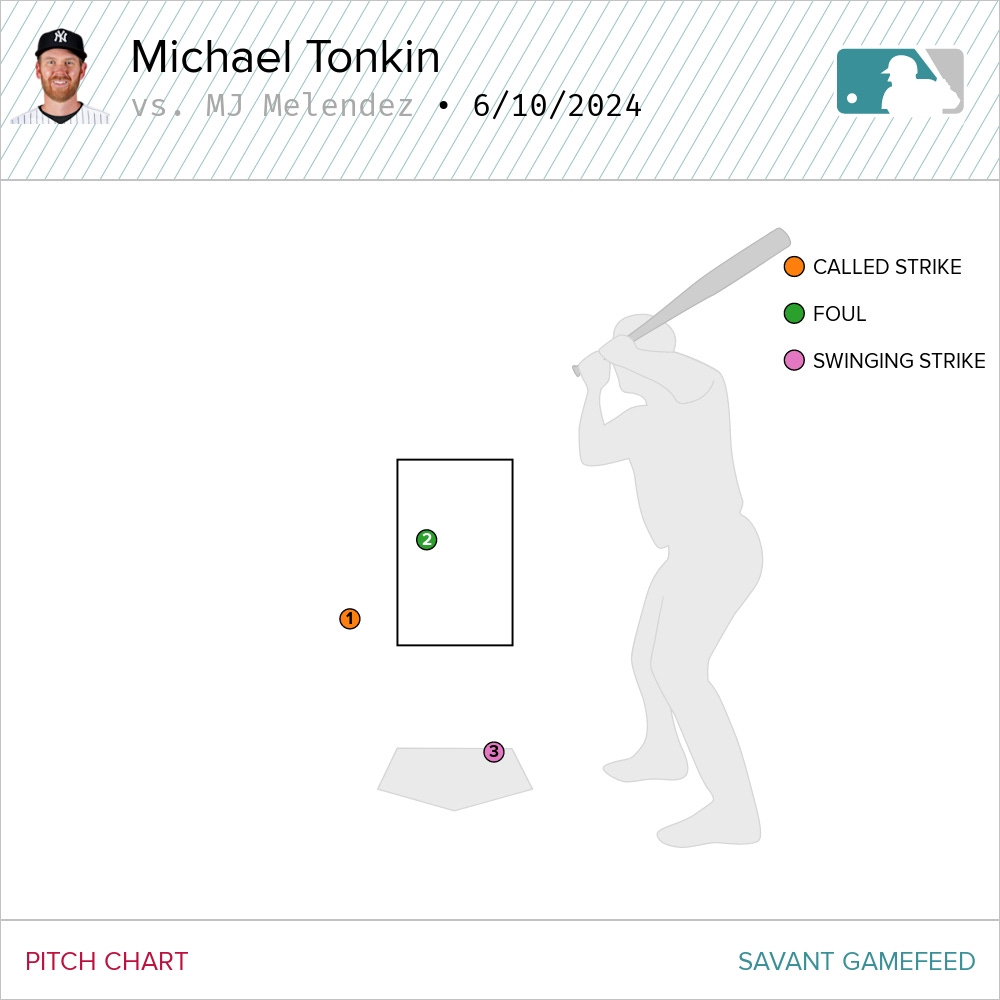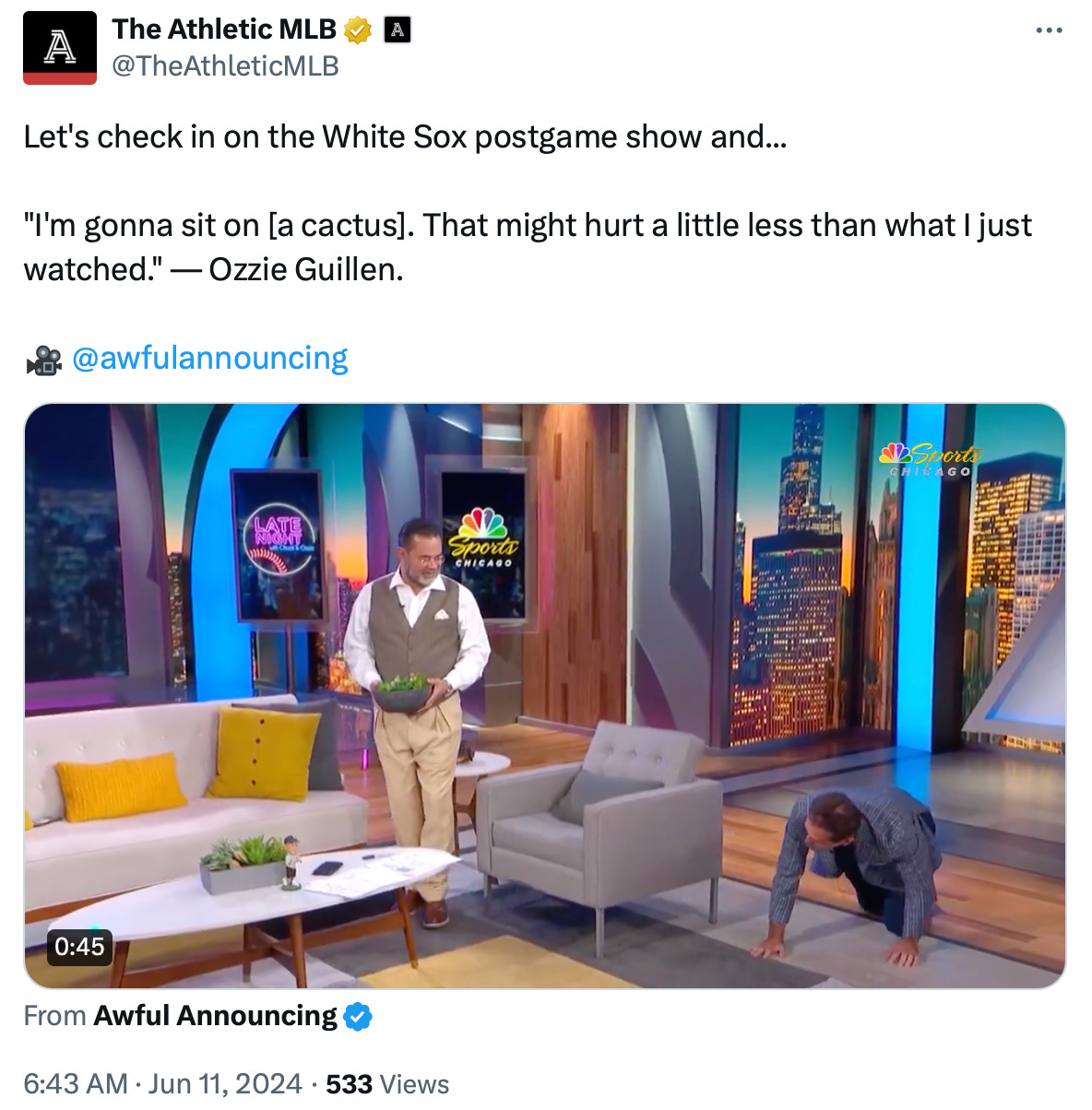Singles night at The K
With an abundance of singles, the Yankees jump out to an early lead against Seth Lugo and the Royals. There would be no comeback on Monday.
They can’t all be exciting.
After a thrilling series against the Mariners over the weekend, the Royals and Yankees engaged in a singles showdown. The two teams combined for 16 hits—15 of them were singles. There were a few bunts and a couple of double plays. Not many strikeouts. “Old-timey baseball” as the Gen Z cohort would probably call it.
The Yankees jumped out to an early lead and never looked like they were interested in surrendering it. They cruised to a 4-2 win.
Seth Lugo threw 24 pitches in the first inning where he went to a full count on three of the six batters he faced. It was a bit of a grind that wasn’t helped by the fact Lugo couldn’t buy a called strike on the lower edge of the zone. That’s a spot where he really wants to set up shop and when that’s not happening for him, he’ll adjust but it’s taking a key tool out of his bag.
New York seemed content to play small ball. I don’t think anyone has ever typed that sentence before. DJ LeMahieu pushed down what I have to say was a perfect bunt along the first base line in the first on a safety squeeze that made the lead 2-0. That came after three consecutive singles plated their opening tally.
I mentioned the strike zone in the first. Home plate umpire Scott Barry is going to be a recurring theme in this edition. I hate writing about umpires. I don’t really think the tight zone impacted Lugo in the first, other than to annoy him. In the fourth, when the Yankees plated their other two runs, it certainly did. After LeMahieu singled with one out, Trent Grisham came up and again, the Yankees called for a bunt. This is what happened.
Grisham squared around and in doing so, stepped out of the batter’s box. The slurve from Lugo broke down and in and hit Grisham on the lower leg. He should’ve been called out. Instead, he was awarded first base.
The next batter, Jahmai Jones, did get down the sacrifice bunt. This one went to the third base side and Maikel Garcia made a fine barehanded play on it, but the runners advanced. They both would come in to score on yes, another single. This one was off the bat of Jose Trevino.
Major props to Lugo, though, who surrendered eight singles on the night along with a walk and two hit batters. Despite all the traffic and the elevated pitch count in the first, he was able to give Matt Quatraro seven innings on—get this—only 101 pitches. It wasn’t Lugo’s best effort but credit to him for saving a couple of innings from the bullpen.
Overall, it was Lugo’s second rough start. In two outings in June, he’s allowed nine runs in 13 innings on 14 hits. I’m not pointing this out as an area of concern—all starters go through rough stretches—rather just reporting facts.
When we last saw Carlos Rodón around these parts, he was chucking baseballs and the Royals were destroying them. You’ll recall last September 29, as the season was winding down Rodón made a Friday night start against the Royals and didn’t record a single out in the first inning. He faced eight batters, all eight reached. All eight scored.
On Monday night, Rodón was able to exorcise those 2023 demons. He went seven strong innings, allowing just five hits and one run.
The Royals’ offense just couldn’t string much together. They put just one runner on in the first four innings when Nick Loftin was hit by a pitch. He was erased on a double play. In the fifth, they got their first hit, which was then followed by their second. They had a little something cooking there. Alas, another double play wiped out any potential rally.
Freddy Fermin, the culprit behind both twin-killings, found redemption in the seventh when his single finally put the Royals on the board against Rodón. It was just never going to be enough.
It wasn’t a good night at all for these Royals. Hunter Renfroe, who as noted yesterday was putting together a fine stretch of offense for the Royals of late, exited the game with a broken big left toe after fouling off two pitches onto his foot in the third inning. With the lack of production from the outfield a season-long theme, Renfroe was attempting to flip at least part of that script. He was hitting .244/.320/.456 since the start of May with four home runs. Since reaching his nadir on May 11 (he finished that day with a .466 OPS), he’s hit .302/.371/.556. That covers a stretch of 70 plate appearances.
There’s no word as of this writing about how long the Royals are expecting Renfroe to miss. I’m going to assume he’s going to land on the IL and Drew Waters will be the corresponding call. We’ll learn more on Tuesday.
The Royals scored their second run in the eighth when Bobby Witt Jr. doubled home Dairon Blanco. Because these are the Royals and because we’ve all seen what happens in the later innings, it felt like this could be the moment. But Salvador Perez couldn’t lay off the high heat and Witt was stranded at second.
The ninth inning brought a glimmer of hope when Nick Lofin walked with one out. Loftin had a nice game, playing his usual solid defense at second and reaching base all four times up. He collected two hits to go along with one HBP and one walk. That brought up Vinnie Pasquantino as a pinch hitter. We know what he can do coming off the bench and he put a charge into one but it fell just short of the warning track in center.
That brought up MJ Melendez.
I think I’ve discovered a way to prevent the Royals from staging a late rally. Take the bat out of their hands.
The first pitch to Melendez was a slider from the right-handed Michael Tonkin. It didn’t start out as a strike and it certainly didn’t end as one. Yet…strike one?
Calls like that alter the shape of the plate appearance. Instead of starting 1-0, Melendez is now in the hole 0-1. Long-time readers know I abhor replay so I’m not sure a challenge system would satisfy me. I’m of the opinion that if the technology exists to make the correct call and the league decides they’d like to deploy that technology, do it in a way where…the correct call is made. Don’t muck it up with some sort of system of challenges. Put an umpire behind the plate with a Pitch-Com type device and he can respond to the prompt.
In the meantime, here was the zone for both teams on Monday.
You can see the Melendez call on the NY side, but as you can see from the Royals pitchers, they benefitted from the wide zone on the third base side. It’s just a grossly inconsistent strike zone from Barry.
This wasn’t the reason the Royals lost and I don’t want it to sound like I’m making excuses or looking for cause. Rodón was good. The Royals’ bats couldn’t get going. It was that kind of night. But Barry at home plate didn’t have a good night at all. From the missed call on the HBP to the floating, random zone, his poor calls made himself a post-game talking point.
I hate writing about umpires.
Prior to the game on Monday, the Royals added reliever Dan Altavilla to their 40-man roster and recalled him from Omaha. Will Klein was shipped out to Triple-A.
Altavilla got into the game in the eighth and looked sharp. He had a lively fastball at 97 MPH and a solid slider. Both pitches had a little swing and miss to them. Can’t say if he’s going to be A Guy in. the bullpen, but it’s a promising start. And at this point, the Royals need to spin that revolving door as much as possible to see what they have. At least ahead of the trade market heating up.
Central Issues
Rockies 0, Twins 5
Chris Paddack and three Twins relievers combined to shut out the Rockies on six hits. Royce Lewis hit a two-run home run in the eighth to salt this one away.
White Sox 4, Mariners 8
The Hapless White Sox held a 4-0 lead going into the bottom of the eighth. And, well…
Seattle tied it with four in the eighth, with three of the runs scoring with two outs against reliever Michael Kopech. The Mariners walked it off with a Cal Raliegh grand slam. Yeah. A cactus may be a good idea.














I'm for replay, in concept. But I will never understand why the NFL and MLB have taken calls for accuracy and accountability and turned it into the gamesmanship we see in their respective challenge systems. If a call is wrong, it's wrong. Why should managers need to ask for a challenge? Why should they be penalized if the umpires disagree? Why don't we just have an umpire reviewing every close call in real time and making sure they're all right?